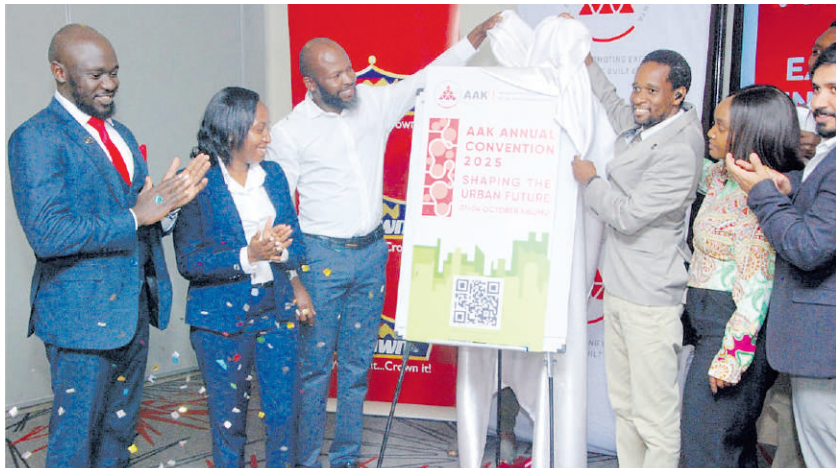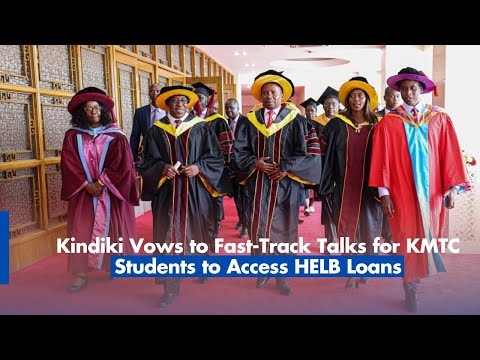

The Architectural Association of Kenya has announced that its 2025 annual convention will be held in Kisumu, marking the return of the event to the lakeside city after more than 20 years.
Set for October 1–3, the convention will bring together over 4,000 professionals from the built environment sector to explore solutions for building sustainable, resilient and inclusive cities.
During the official launch in Kisumu, Ruth Wanjiku, a landscape architect and secretary general of AAK, said the city was chosen for its exemplary strides in urban planning and infrastructure.
“We are here to launch the AAK Convention Centre for this year, which returns to Kisumu after over 20 years. The theme, ‘Shaping the urban future’, focuses on how professionals and stakeholders can work together to create better living spaces for our growing urban population,” Wanjiku said.
This year’s convention comes at a time when rapid urbanisation, climate change and construction failures have underscored the need for bold, innovative planning across the country.
She praised Kisumu’s development journey, highlighting its structured master plan, improved pedestrian routes, green infrastructure and efforts to implement smarter mobility systems.
“As an intermediary city, Kisumu plays a key role in showing how upcoming urban areas can develop better than even the capital. Nairobi can learn a thing or two. Kisumu is a model worth building on,” she added.
A platform for innovation and solutions
AAK described the annual convention as its flagship event, drawing together architects, engineers, urban planners, landscape designers, quantity surveyors and construction experts from across Kenya and beyond.
"This convention is more than just a meeting. It’s a commitment to action. We’re bringing together government, academia, civil society and industry to find practical solutions for Kenya’s urban future,” Wanjiku said.
The discussion will revolve around four thematic areas which include: ‘From plans to reality’, turning urban strategies into effective systems through policy, data and finance; and ‘Designing spaces for life’, which will see the creation of inclusive, safe and high-quality urban environments.
Others are ‘Building climate resilient cities’ to encourage sustainable transformation and green growth; and ‘Driving urban innovation’ by promoting cross-sector collaboration for next-generation cities.
The convention will also serve as the official launchpad for AAK’s Western branch, in part of the association’s broader push to decentralise and strengthen its regional presence.
“We’ve had a branch in Mombasa before and this new Western branch is one of our newest babies,” Wanjiku noted.
“In the spirit of devolution, we want to ensure professionals across all regions are represented, supported and actively engaged.”
Oscar Ogunde, interim chairperson of the newly formed branch, called on professionals to speak out when political decisions compromise urban development.
“When Lwang'ni Beach was demolished, life in Kisumu changed for the worse. That happened because professionals stayed quiet. We must start calling the political class to order,” Ogunde said.
He stressed the need for deeper collaboration with county governments, especially in areas where technical planning capacity remains low.
“Some counties still don’t have enough skilled personnel. This convention will be an opportunity to address that gap and explore how professionals can better support county development,” he added.
Addressing construction failures and professional gaps
Although AAK is a voluntary membership organisation, members must adhere to strict ethical standards.
The association also works closely with regulatory bodies to ensure only licensed professionals operate within the build environment space.
Recent cases of building collapses across the country have raised alarm over construction practices across Kenya.
AAK says such disasters are often caused by poor workmanship, use of substandard materials and the limited involvement of professionals throughout the project lifecycle.
The association is committed to changing this.
One such intervention is the Mulika Mjengo digital platform, which allows the public to report non-compliant or unsafe construction sites directly to the association.
“It’s one of the ways we ensure safety and accountability. We also have a disciplinary committee to address misconduct among members. If a professional is involved in unethical practices, we act,” Wanjiku explained.
As Kenya’s towns rapidly transform into cities, AAK hopes to lead the charge in shaping urban areas that are liveable, inclusive and sustainable for future generations.
“We’re inviting all professionals, government officials, development partners and academic institutions to be part of this convention. It promises to be a dynamic and transformative experience,” Wanjiku said.

















